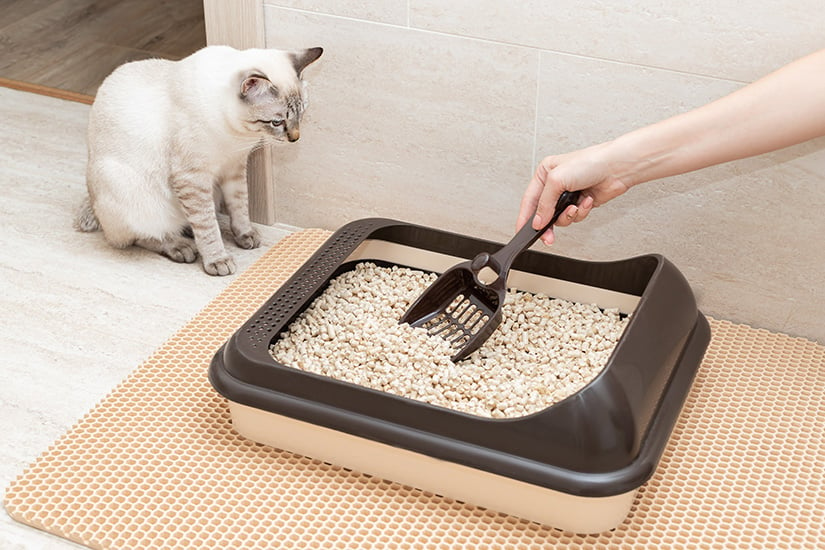Despite your best intentions, dealing with litter box issues can be a real hassle. But fear not! By tackling these problems head-on, you can prevent them from spiralling into major headaches down the line. Here are some common reasons why your kitty might be giving the litter box the cold shoulder.
Choosing the Right Litter Box
When it comes to litter boxes, size and type matter more than you might think. Just like us, cats have their own preferences. Some fancy the spaciousness of an open litter box, while others appreciate the privacy of a closed one. The key is to observe your cat's behaviour and adjust accordingly. For those curious kitties who like to survey their surroundings while they do their business, an open litter box might be ideal. On the other hand, shy or easily startled cats may prefer the seclusion provided by a closed box.Additionally, it's important to consider the size of the litter box. A comfortable size for your cat is crucial. A box that's too small can make your cat feel cramped and uncomfortable, leading to accidents outside the box. On the other hand, a box that's too large might be intimidating for some cats, especially kittens or elderly felines. Finding the right balance is key to ensuring your cat feels at ease while using their litter box. Remember, variety is the spice of litter life, so don't be afraid to try different sizes and styles until you find the perfect fit for your furry friend.
Type of Litter and Scooping Regularly
The type of litter you use in your cat's litter box can play a significant role in their willingness to use it. Cats can be picky about the texture and scent of their litter, so it's essential to choose one that suits their preferences. Whether you opt for clumping, non-clumping, scented, or unscented litter, ensure it's comfortable for your cat and doesn't cause any irritation.
Additionally, scooping the litter box regularly is crucial for maintaining cleanliness and encouraging your cat to use it consistently. Cats prefer a clean litter box, and neglecting to scoop waste regularly can lead to aversion and litter box avoidance. Aim to scoop the litter box twice a day, removing any clumps and solid waste to keep it fresh and inviting for your cat.
The Rules of Mutiples
Ever noticed how cats are pretty finicky about their bathroom situation? They're not big fans of sharing their litter box territory. So, to dodge any potential kitty conflicts and make sure each furball has a pristine place to go, remember this handy rule: one litter box per cat, plus an additional one just to be safe. By scattering several litter boxes throughout your home, you're granting each feline their own private restroom, free from any awkward bathroom standoffs.
Strategic Placement
Imagine if someone placed your bathroom next to the kitchen table—awkward, right? Cats feel the same way about their litter box placement. Keep them away from noisy appliances and, most importantly, far from their dining area. Cats are civilised creatures, after all, and even they appreciate a little privacy when they're answering nature's call. If you have multiple cats, spreading out the litter boxes ensures each feline has their own private powder room. Cats are territorial animals, and having their own designated bathroom spot can help reduce conflicts and ensure everyone gets their turn without feeling crowded or stressed.
If they keep doing their business in a particular spot in your home. It might be time to place a litter tray in that area and see if things improve.
Change In Environment
Cats are creatures of routine and comfort, and any shake-up in their environment can send them into a litter box rebellion. Imagine being whisked away from your favourite hangout spot or having your bedroom rearranged without warning – you'd be stressed too! That's exactly how your cat feels when faced with a sudden change. To ease their anxiety and prevent litter box mishaps, it's crucial to provide plenty of comfort and reassurance. Stick to a routine, offer familiar comforts like their favourite blanket or toy, and create cozy hideaways where they can unwind.
Urinary Problems
Nothing throws a wrench in your cat's bathroom routine quite like a urinary tract issue. From painful infections to pesky crystals, these problems can turn your once-fluffy friend into a grumpy ball of discomfort. However, there's a potential solution on the horizon: raw feeding.
By providing a diet rich in raw meat, bones, and organs, raw feeding offers a natural approach to promoting urinary tract health. The moisture content in raw meat helps keep cats hydrated, possibly reducing the risk of urinary issues, while balanced nutrition supports a healthy urinary pH balance. Transitioning to a raw feeding diet may not only address urinary problems but also promote overall feline wellness, potentially alleviating litter box woes in the process.
To determine if your cat has urinary issues please consult with a Veterinarian.
By sticking to these comprehensive guidelines and tuning into your cat's needs, you can create a litter box setup that's purr-fect for both you and your feline friend. From choosing the right box to addressing any issues promptly, you'll pave the way for a harmonious relationship and a happier, healthier home for all.
